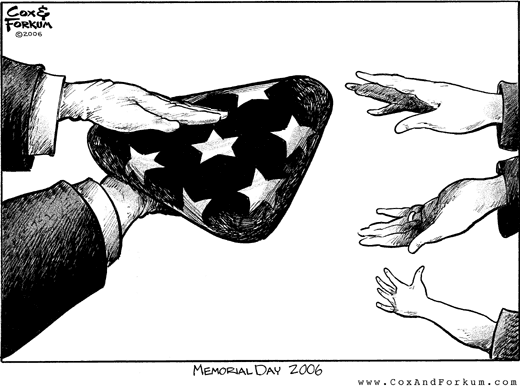Every Memorial Day, we pay tribute to the American men and women who have died in combat. With speeches and solemn ceremonies, we recognize their courage and valor. But one fact goes unacknowledged in our Memorial Day tributes: all too many of our soldiers have died unnecessarily–because they were sent to fight for a purpose other than America’s freedom.
The proper purpose of a government is to protect its citizens’ lives and freedom against the initiation of force by criminals at home and aggressors abroad. The American government has a sacred responsibility to recognize the individual value of every one of its citizens’ lives, and thus to do everything possible to protect the rights of each to life, liberty, property, and the pursuit of happiness. This absolutely includes our soldiers.
Soldiers are not sacrificial objects; they are full-fledged Americans with the same moral right as the rest of us to the pursuit of their own goals, their own dreams, their own happiness. Rational soldiers enjoy much of the work of military service, take pride in their ability to do it superlatively, and gain profound satisfaction in protecting the freedom of every American, including their own freedom.
Soldiers know that in entering the military, they are risking their lives in the event of war. But this risk is not, as it is often described, a “sacrifice” for a “higher cause.” When there is a true threat to America, it is a threat to all of our lives and loved ones, soldiers included. Many become soldiers for precisely this reason; it was, for instance, the realization of the threat of Islamic terrorism after September 11–when 3,000 innocent Americans were slaughtered in cold blood on a random Tuesday morning–that prompted so many to join the military.

Cartoon by Cox and Forum
For an American soldier, to fight for freedom is not to fight for a “higher cause,” separate from or superior to his own life–it is to fight for his own life and happiness. He is willing to risk his life in time of war because he is unwilling to live as anything other than a free man. He does not want or expect to die, but he would rather die than live in slavery or perpetual fear. His attitude is epitomized by the words of John Stark, New Hampshire’s most famous soldier in the Revolutionary War: “Live free or die.”
What we owe these men who fight so bravely for their and our freedom is to send them to war only when that freedom is truly threatened, and to make every effort to protect their lives during war–by providing them with the most advantageous weapons, training, strategy, and tactics possible.
Shamefully, America has repeatedly failed to meet this obligation. It has repeatedly placed soldiers in harm’s way when no threat to America existed–e.g., to quell tribal conflicts in Somalia, Bosnia, and Kosovo. America entered World War I, in which 115,000 soldiers died, with no clear self-defense purpose but rather on the vague, self-sacrificial grounds that “The world must be made safe for democracy.” America’s involvement in Vietnam, in which 56,000 Americans died in a fiasco that American officials openly declared a “no-win” war, was justified primarily in the name of service to the South Vietnamese. And the current war in Iraq–which could have had a valid purpose as a first step in ousting the terrorist-sponsoring, anti-American regimes of the Middle East–is responsible for thousands of unnecessary American deaths in pursuit of the sacrificial goal of “civilizing” Iraq by enabling Iraqis to select any government they wish, no matter how anti-American.
In addition to being sent on ill-conceived, “humanitarian” missions, our soldiers have been compromised with crippling rules of engagement that place the lives of civilians in enemy territory above their own. In Afghanistan we refused to bomb many top leaders out of their hideouts for fear of civilian casualties; these men continue to kill American soldiers. In Iraq, our hamstrung soldiers are not allowed to smash a militarily puny insurgency–and instead must suffer an endless series of deaths by an undefeated enemy.
To send soldiers into war without a clear self-defense purpose, and without providing them every possible protection, is a betrayal of their valor and a violation of their rights.
This Memorial Day, we must call for a stop to the sacrifice of our soldiers and condemn all those who demand it. It is only by doing so that we can truly honor not only our dead, but also our living: American soldiers who have the courage to defend their freedom and ours.
Copyright



